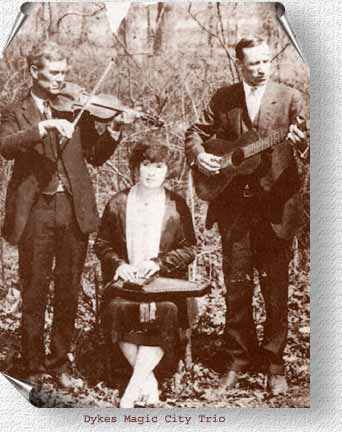Annotation:Tennessee Girls: Difference between revisions
No edit summary |
No edit summary |
||
| (3 intermediate revisions by the same user not shown) | |||
| Line 1: | Line 1: | ||
{{TuneAnnotation | {{TuneAnnotation | ||
|f_annotation='''TENNESSEE GIRLS/GAL.''' American, Reel (cut time). USA, east Tennessee. D Major. Standard tuning (fiddle). AB (Silberberg): AABBBB (Phillips). Musicologist and country music researcher Charles Wolfe called "Tennessee Girls" "a familiar east Tennessee tune". The reel was recorded in New York in 1927 on a Brunswick Records 78 RPM by the | |f_annotation=[[File:dykes.jpg|400px|thumb|right|Dykes' Magic City Trio]]'''TENNESSEE GIRLS/GAL.''' American, Reel (cut time). USA, east Tennessee. D Major. Standard tuning (fiddle). AB (Silberberg): AABBBB (Phillips). Musicologist and country music researcher Charles Wolfe called "Tennessee Girls" "a familiar east Tennessee tune". The reel was recorded in New York in 1927 on a Brunswick Records 78 RPM by John Dykes (c.1882- 1940's?), of the Kingsport, northeast Tennessee, area (on the border with Virginia), leader of the Dykes Magic City trio, which also included Myrtle Vermillion on autoharp and Hub Mahaffey on guitar (with vocals sometimes later supplied by Dykes' brother-in-law, Dock Boggs). Kingsport at the time was boosting itself as “the magic city” because of it’s progressiveness. An article in the '''Kingsport Times''' on February 18th, 1927, reported “The Kingsport Trio, known as John R. Dykes’ string band…were introduced by Kiwanian T.R. Bandy [who] announced that this trio had been selected out of a group of 50 such organizations by the Brunswick Phonograph Company, of New York, to make records.” | ||
|f_source_for_notated_version=John Dykes (Milliner-Koken); Ron Kane with the Deseret String Band [Phillips]; Forrest Carroll [Silberberg]. | <br> | ||
|f_printed_sources=Clare Milliner & Walt Koken ('''Milliner-Koken Collection of American Fiddle Tunes'''), 2011; p. 651. Phillips ('''Traditional American Fiddle Tunes, vol. 1'''), 1994; p. 238. Silberberg ('''Tunes I Learned at Tractor Tavern'''), 2002; p. 157. | <br> | ||
|f_recorded_sources=Brunswick 120 (78 RPM), Dykes Magic City Trio (1927). Field Recorder FRC 601, Jeff Goehring - "With Family and Friends" (2007. Recorded in 1993). Dykes Magic City Trio - "Times Ain't Like They Used | John Dykes was fingering the fiddle as if playing in the key of D, although the recording sounds in C, either because he tuned down or from a faulty recording process. Doug Dorschug (ex-Highwoods String Band), who has collected and played autoharps from that time period, believes that Magic City Trio band member Myrtle Vermillion’s autoharp only played in C and F, requiring the fiddle to be tuned a step down if the ‘D’ fingering position was to be used. The recording features called prompts for a square dance by the guitar player for the band, G.H. "Hub" Mahaffey. | ||
|f_see_also_listing=Hear the Dykes Magic City Trio's 1927 recording at youtube.com [https://www.youtube.com/watch?v=9IZ6byRzsm8] and Slippery Hill [https://www.slippery-hill.com/content/tennessee-girls] | |f_source_for_notated_version=John Dykes (<span>c. 1882-1940's)</span>(Milliner-Koken); Ron Kane with the Deseret String Band [Phillips]; Forrest Carroll [Silberberg]. | ||
|f_printed_sources=Clare Milliner & Walt Koken ('''Milliner-Koken Collection of American Fiddle Tunes'''), 2011; p. 651. Phillips ('''Traditional American Fiddle Tunes, vol. 1'''), 1994; p. 238. Silberberg ('''Tunes I Learned at Tractor Tavern'''), 2002; p. 157. | |||
|f_recorded_sources=Brunswick 120 (78 RPM), Dykes Magic City Trio (1927). Field Recorder FRC 601, Jeff Goehring - "With Family and Friends" (2007. Recorded in 1993). Yazoo Records 2028, Dykes Magic City Trio - "Times Ain't Like They Used to Be: Early American Rural Music. Classic Recordings of the 1920’s and 30's. Vol. 1" (1997). Venerable CD 280, Dykes Magic City Trio. | |||
|f_see_also_listing=Hear the Dykes Magic City Trio's 1927 recording at youtube.com [https://www.youtube.com/watch?v=9IZ6byRzsm8] and Slippery Hill [https://www.slippery-hill.com/content/tennessee-girls] | |||
}} | }} | ||
Latest revision as of 20:36, 7 July 2021
X:1 T:Tennessee Girls N:From the playing of fiddler John Dykes () with his family band, N:the Dykes Magic City Trio. M:C| L:1/8 R:Reel Q:"Fast" D:Brunswick 120 (78 RPM), Dykes Magic City Trip (1927) D:https://www.slippery-hill.com/content/tennessee-girls Z:Andrew Kuntz K:D ([DA]|d)efd e2e2|defd ecee|defd efed|BA2 A2(3A/B/c/| d)efd AAA2|defd A2Bc|defd A2 Ad|B2A2A2((3ABc| d)efd cdec|defd e3e| deff e2ed | B2A2A2Ac| defd ecee|defd e3e|defd efed|B2A2A2|| |:Ac|d2f-a a2ba|f2a2a2fe|d2fa a2 ba|f2d2 e4| d2 (fa) a2 ba|f2a2e2d2|fafe d2ee|B2A2A2:|]

John Dykes was fingering the fiddle as if playing in the key of D, although the recording sounds in C, either because he tuned down or from a faulty recording process. Doug Dorschug (ex-Highwoods String Band), who has collected and played autoharps from that time period, believes that Magic City Trio band member Myrtle Vermillion’s autoharp only played in C and F, requiring the fiddle to be tuned a step down if the ‘D’ fingering position was to be used. The recording features called prompts for a square dance by the guitar player for the band, G.H. "Hub" Mahaffey.

